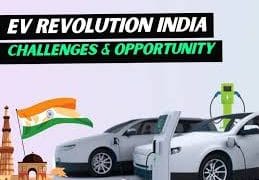Electric vehicles (EVs) are gaining momentum worldwide as a cleaner and sustainable alternative to traditional fossil fuel-powered cars. In India, the EV revolution is picking up pace, driven by environmental concerns, government incentives, and technological advances. But the journey toward widespread adoption also faces significant challenges.
Let’s explore the current landscape of EVs in India, the opportunities they present, and the hurdles that need to be overcome.
🌟 Why Electric Vehicles Matter for India
✅ Reducing Pollution: EVs help lower air pollution and greenhouse gas emissions, improving public health.
✅ Energy Security: Reducing reliance on imported oil enhances India’s energy independence.
✅ Cost Savings: Over time, EVs offer lower running and maintenance costs compared to petrol/diesel vehicles.
✅ Technological Growth: EV adoption spurs innovation and job creation in the automotive and battery sectors.
🚗 Current Status of EVs in India
🔹 Growing Market: Electric two-wheelers and three-wheelers dominate sales, with electric cars gradually increasing.
🔹 Government Support: Policies like the Faster Adoption and Manufacturing of Hybrid & Electric Vehicles (FAME) scheme offer subsidies and incentives.
🔹 Charging Infrastructure: Expansion of charging stations in metro cities and highways is underway.
🔹 Domestic Manufacturing: Initiatives like Make in India encourage local production of EV components and batteries.
🚧 Challenges Hindering EV Adoption
🔹 High Initial Cost: EVs are still more expensive upfront than conventional vehicles, deterring many buyers.
🔹 Charging Infrastructure: Limited and unevenly distributed charging stations create range anxiety.
🔹 Battery Technology: Dependence on imported batteries and concerns about battery life and disposal persist.
🔹 Consumer Awareness: Many potential buyers lack information about EV benefits and usage.
🔹 Grid Capacity: Increased electricity demand requires upgrades to power infrastructure.
🌱 Opportunities Ahead
✅ Innovation: Advances in battery tech and renewable energy integration can lower costs and improve performance.
✅ Policy Evolution: Continued government incentives and supportive regulations will boost adoption.
✅ Public Transport Electrification: Electric buses and shared mobility solutions offer scalable impact.
✅ Environmental Benefits: Widespread EV use can help India meet its climate commitments under the Paris Agreement.
🌟 The Road to a Greener Future
India’s EV ecosystem is evolving rapidly, with startups, manufacturers, and policymakers collaborating to address challenges. The future of mobility in India looks electric — cleaner, smarter, and more sustainable.
🚀 Final Thoughts
Electric vehicles are more than just a trend; they represent a transformational shift toward sustainable transportation. By overcoming current challenges and embracing innovation, India can accelerate its EV journey and lead the way in green mobility.
💬 Are you considering switching to an electric vehicle? What are your thoughts on the EV market in India? Share your opinions in the comments!
Would you like me to add comparisons of popular EV models in India or tips for new EV buyers? Let me know!

































































